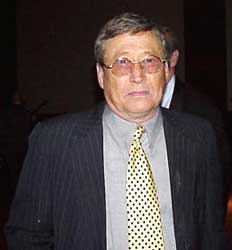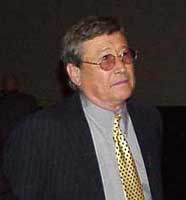Major Works
- Yonder Stands Your Orphan (2001)
- High Lonesome (short stories, 1996)
- Men Without Ties (nonfiction, 1995)
- Bats Out of Hell (short stories, 1993)
- Never Die (1991)
- Boomerang (1989)
- Hey Jack! (1987)
- Captain Maximus (1985)
- Power and Light: A Novella for the Screen from an Idea by Robert Altman (1983)
- The Tennis Handsome (1983)
- Ray (1980)
- Airships (short stories, 1978)
- Geromino Rex (1976)
- Nightwatchmen (1976)
Biography of Barry Hannah (1999)
by Davis Herring (SHS)
Barry Hannah, author of numerous Southern novels and short stories, was born in Meridian on April 23, 1942, and grew up in Clinton. In 1964, he obtained a B.A. from Mississippi College and later earned an M.A. and a Master of Fine Arts from the University of Arkansas in 1966 and 1967. Then, Hannah taught creative writing at Clemson University in South Carolina until 1973, earning several writing awards in the meantime. Barry Hannah’s writing style has been influenced by great Southern writers such as William Faulkner, Flannery O’Connor, Tennessee Williams, Truman Capote (Limsky), and Eudora Welty (Contemporary Criticism, 231). Geronimo Rex, Hannah’s first novel, earned him the William Faulkner Prize for writing and a nomination for the National Book Award (Kornegay). The novel Nightwatchmen, published one year later, confirmed his reputation as an up-and-coming writer (U. Miss.). Hannah has twice been nominated for the National Book Award, forGeronimo Rex in 1973 and Ray in 1981. He has been honored by the American Academy for Arts and Letters and by Esquire magazine in the early ’80s. In 1987, Hannah also received the Mississippi Governor’s Award and the Letters Award.
After teaching at Clemson, Hannah taught for a short period at Middlebury College in Vermont and then for five years at the University of Alabama. While at Alabama, Hannah wrote Airships (1978), which won the Arnold Gingrich Short Fiction Award and the Award for Literature from the American Institute of Arts and Letters.
After teaching at Alabama, Hannah moved to Hollywood to write screenplays for director Robert Altman. Ray was published while he was there, but he decided to leave Hollywood behind. He then took several one-year teaching and writer-in-residence positions at universities around the country. Moving to Oxford, Mississippi, since 1982, he for the past sixteen years has been teaching creative writing from the position of writer-in-residence at the University of Mississippi. During this time, he has published The Tennis Handsome (1983), Captain Maximus (1985), Hey Jack!(1987), and Boomerang(1989), Never Die (1991), Bats Out of Hell (1993), and High Lonesome (1996), which was nominated for the Pulitzer Prize in fiction (Annotations). As writer-in-residence he has influenced such writers as Larry Brown, Cynthia Shears, and Donna Tartt (all now writers in their own right).
Hannah’s first novel in ten years called Yonder Stands Your Orphan has just been published (2001). The novel includes madness, murder, and sin and is set near Vicksburg. The protaganist is a thief, pimp and murderer named Man Mortimer, a trouble maker of the first order. The novel is described by Publishers Weekly as Hannah’s best work yet.
The critical reaction to Hannah’s work has focused on his dark style of writing. His characters in High Lonesome have been described as “tormented characters” (Kornegay). Hannah’s style is described in Drew Limsky’s article as “…drawn to the festering rural misfit–the 40-year old at the end of the bar who’s scratching his beard stubble and wondering why he didn’t amount to much.” Hannah himself has said that he prefers writing short stories to novels and states that “Teaching inspires me… My writing has been described as ‘hypnotic’ and ‘almost relentlessly interior'” (U. Miss. NewsDesk).
In the past twenty-five years, Barry Hannah has published novels, three short story collections, two works of nonfiction, and one work for the Hollywood screen (U. Miss.). He has received numerous awards and recognition for his work and is generally regarded as a master of modern fiction. The Fellowship of Southern Writers awarded him the prestigious Lifetime Achievement Award.
Barry Hannah was diagnosed with cancer but underwent treatment. He fought cancer for fifteen years. His last novel was Yonder Stands Your Orphan.
UPDATE:
Barry Hannah died on March 1, 2010, of natural causes just before the Oxford Conference of the Book was to honor his work. He was awarded the Fiction Prize by the Mississippi Institute of Arts and Letters twice and received the Mississippi Governor’s Award in 1989. Hannah was director of the MFA program at the University of Mississippi, in Oxford, where he had taught creative writing for 28 years.
Timeline
- 1942: April 23, Born in Clinton, Mississippi
- 1964: Obtained B.A. at Mississippi College
- 1966: Obtained M.A. at the University of Arkansas
- 1967: Obtained a Master of Fine Arts in Creative Writing at the University of Arkansas
- 1967-1973: Taught creative writing at Clemson University in South Carolina
- 1970: Won Bellaman Foundation Award in Fiction Writing
- 1971: Won Bread Loaf Fellowship for Writing
- 1972: First novel, Geronimo Rex, published; earned nomination for National Book Award
- 1973: Nightwatchmen published
- 1974-1975: One year as Writer-in-Residence at Middlebury College, Vermont
- 1975-1980: Five-year position teaching literature and creative writing at the University of Alabama
- 1978: Airships published; won Arnold Gingrich Short Fiction Award
- 1979: Won Award for Literature from the American Institute of Arts and Letters
- 1980: Moved to Hollywood to write film scripts for Robert Altman
- 1980: Ray published
- 1981: Writer-in-Residence at the University of Iowa
- 1982: Writer-in-Residence at the University of Mississippi
- 1983: Writer-in-Residence at the University of Montana-Missoula
- 1983: The Tennis Handsome published
- 1983–present: Writer-in-Residence and professor of creative writing at the University of Mississippi
- 1985: Captain Maximus published
- 1987: Hey Jack! published
- 1989: Boomerang published
- 1991: Never Die published
- 1993: Bats Out of Hell published
- 1996: High Lonesome published; nominated for Pulitzer Prize in fiction
- 1999: Barry Hannah is currently writing another novel (Hannah in letter to Davis Herring)
- 2001: Yonder Stands Your Orphan published
- 2001: Hannah “remembers Eudora Welty” at the 2001 Welty Symposium at MUW along with writers Larry Brown and Ellen Douglas (See photo above right).
- 2010: Barry Hannah died several days before the Oxford Conference of the Book was to honor him
Reviews
A Review of Boomerang
by Meisam Mohammadnetadj (SHS)
The novel Boomerang by Barry Hannah is a story filled with love, war, good times, and bad. This novel is a firsthand look at Hannah’s life with fictional names and scenes occasionally inserted to make the novel more interesting for the reader. This novel uses the symbol of a boomerang to represent the memory and the influence of the past upon the present (Day 94). In the novel Hannah leaps from one memory to another, sharing his feelings filled with triumph and tragedy. For example, Hannah shares times that include his failures in his previous marriages, his struggling relationship with his children, and his friendship with other writers and actors.
Boomerang’s settings were many. The novel started off with the author telling about youthful acts in a peach orchard and ended with the compelling story of his friend Yelvertson in Memphis. Hannah makes the reader actually feel like he is part of Hannah’s life. The novel was written in first person with Hannah sharing his own thoughts with the reader. Hannah’s attempt to portray life as it really happened is sometimes dulled with some of his obvious fictional mind-set.
This novel has no set themes. Hannah just shows the good side of life and the bad in a style that is amusing to the reader. Hannah writes about many problems that he tries to overcome, but he also names many enjoyable experiences.
In conclusion, this novel was very humorous and enjoyable. Hannah’s style is an excellent way for an author to write about his life and not make it boring for the reader. Hannah gets a lot of criticism for some of his work, but I think he is one of Mississippi’s most distinguished authors with an interesting writing style that is fun to read.
A Review of Tennis Handsome
by Davis Herring (SHS)
In Barry Hannah’s novel The Tennis Handsome, he stretches the bounds of modern literature. In a literal way he does this through the use of extensive verisimilitude in his writing, both in dialogue and in action, describing the speech accurately and the liaisons of the characters in detail. While this frankness may be found offensive by some, the story, while speaking frequently of such actions, is not centered on the encounters but on the relationships of the four central Vicksburg natives in which the rendez-vous play a part. His narrative moves quickly from character to character, changing viewpoints as it goes, almost in a Faulknerian style. The narrative begins with Dr. “Baby” Levaster and French Edward, moves to Dr. James Word, and finds Captain Bobby Smith fighting in Vietnam. From the time each character is introduced, Hannah follows their lives, showing how they change, or don’t change, and how the lives of the four central characters, all from Vicksburg, converge–flashbacks to before the opening of the story reveal that when the tennis handsome French Edward was in high school, none of the other characters know him, but by the end of the story they all know each other quite well. As the story progresses, the same sequences of events are sometimes viewed by different people, giving a vivid reality to the story. Furthermore, as the foursome’s lives begin intertwining, they draw in all who know them into their dance and add the newcomers to each other’s lives.
The story is skillfully written in a style of grim reality where life is no more than it appears to be, and often less, where the frailties of human nature and the follies of life are shown to be overbearing, and where is fathomed the dark realities of the four lives.
Related Websites
- Amazon.com Books review site for High Lonesome.
- Review of Yonder Stands Your Orphan by Ellen Kanner in Bookpage.
- Interesting review of YSYO by Joe Hartlaub.
- An article at Hannan’s death containing information on his career from the Mississippi College newspaper.
Bibliography
- “Amazon.com: A Glance: High Lonesome.” Amazon.com Books. [Online] Available http://www.amazon.com/exec/obidos/ASIN/0871136686/qid=923538706/sr=1-1/002-2488420-3147047, April 6, 1999.
- “barnesandnoble.com – Author Biography.” [Online] Available http://shop.barnesandnoble.com/booksearch/authorInfo.
- Beard, David. “Echoes from Oxford.” Amusement Scope October 23-30, 1987.
- Contemporary Literary Criticism. Vol. 38. Detroit: Gale Research Co., 1986. 231.
- “English Department NEWS/EVENTS.” Annotations Online. The University of Mississippi English Department. [Online] Available http://www.olemiss.edu/depts/english/news/newsletter/1996spring/art4.html, May 5, 1999.
- Fuller, Dan. “[MC Beacon] – On Campus.” Mississippi College. [Online] Available http://www.mc.edu/publications/beacon/sum97/oncampus.html, April 6, 1999.
- Hannah, Barry. Letter to Davis Herring, April 14, 1999.
- Hodges, Sam. “Hannah Deserves Exclamations for Novel, ‘Hey Jack!’.” Clarion Ledger, 1987.
- Koeppel, Fredric. “Hannah Lets Us Take Look Under the Rock.” Commercial Appeal, February 21, 1993.
- Kornegay, Jamie. “DM: Hannah nominated for Pulitzer Prize.” The Daily Mississippian. The University of Mississippi. [Online] Available , April 6, 1999.
- Limsky, Drew. “y’all @ the arts: arts, entertainment, fun and silly things people do.” Y’all. [Online] Available http://www.accessatlanta.com/global/local/yall/thearts/quill/hannah.html, April 6, 1999. (Unfortunately, this site is no longer available.)
- “MWP: Barry Hannah (1942- ).” [Online] Available http://www.olemiss.edu/depts/english/ms-writers/dir/hannah_barry/, April 1, 1999.
- Pate, Nancy. “Short and Sweet.” Clarion Ledger, January 1995.
- Weston, Ruth D. “‘The Whole Lying Opera of It’: Dreams, Lies, and Confessions in the Fiction of Barry Hannah.” Mississippi Quarterly, Fall 1991. Vol. XLIV, No. 4. Mississippi State, MS: Mississippi State University. 411-428.




